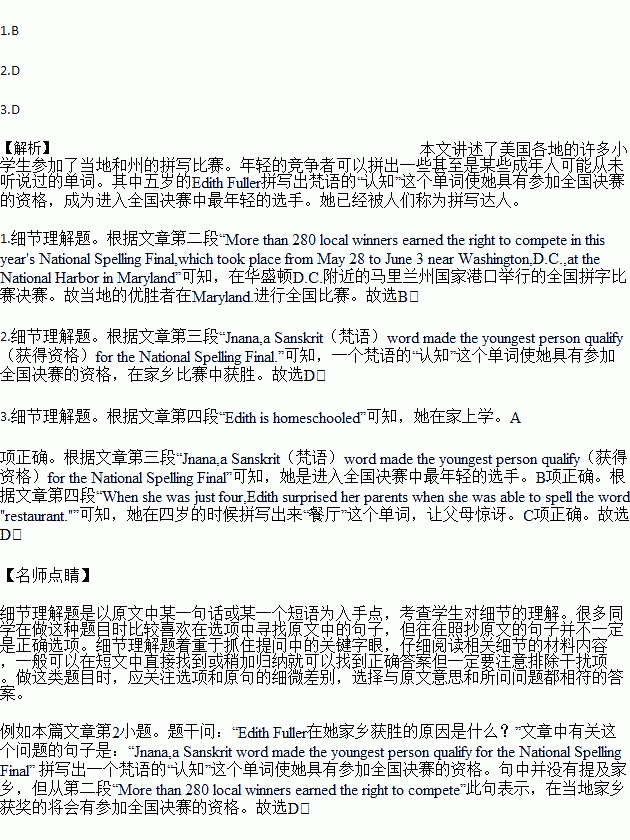题目内容
This year,many schoolchildren across the United States have taken part in local and state spelling competitions. The young competitors could spell words that even some adults may never have heard of.
More than 280 local winners earned the right to compete in this year's National Spelling Final,which took place from May 28 to June 3 near Washington,D.C.,at the National Harbor in Maryland.Most competitors in the National Spelling Final were between the ages of 12 and 14.But one competitor was less than half that age—five-year-old Edith Fuller.She won an area spelling competition in her home state of Oklahoma.The five-hour competition lasted 37 rounds.Edith correctly spelled words
like sevruga(一种俄罗斯鱼子酱),jacamar (a kind of bird);and Nisei (a child of Japanese immigrants).Jnana,a Sanskrit(梵语)word made the youngest person qualify(获得资格)for the National Spelling Final.
When she was just four,Edith surprised her parents when she was able to spell the word "restaurant."At that moment,her mom and dad realized their child might be something special there.Edith is homeschooled,so her parents are able to spend a little more time teaching her to spell.
Her mom spoke with the Media about the benefits of homeschooling Edith."We have the freedom to answer her questions,to help her advance at her own pace,"she said.Now,Edith is already being called a "spellebrity(拼写达人)."
1.Where did the local winners take part in the National Spelling Final?
A. In Washington D.C..
B. At the National Harbor in Maryland.
C. In Oklahoma.
D. It's not mentioned in the passage.
2.The reason why Edith Fuller won in her home state is that .
A. she was the youngest competitor
B. she could spell the words like sevuga,jacamar,etc
C. she competed in 37 rounds
D. she could spell Jnana,a Sanskrit word
3.What can we know about Edith after reading this passage?
A. She was a homeschooled kid.
B. She was the youngest person to qualify for the National Spelling Final.
C. Her parents were ever surprised at her spelling gift.
D. All are right.
在此次高三模拟考试前,你们班就试题该易还是该难进行了一次调查。请结合下表内容,用英语写一篇短文,介绍有关调查情况并发表你的看法。
赞 成 偏 难 | 赞 成 偏 易 |
1. 喜欢挑战,越难越好 2. 有助于了解自己的薄弱环节 | 1. 题目太难会泄气,并害怕今后的高考 2. 题目简单易得高分,增强自信心 |
注意:1. 词数120左右,开头已为你写好(不计入总词数);
2. 可适当增加细节,使行文连贯。
Recently we have made an investigation on whether the test paper for Senior Three students should be difficult or not.
_______________________________________________________________________________
_______________________________________________________________________________
_______________________________________________________________________________
_______________________________________________________________________________
_______________________________________________________________________________

